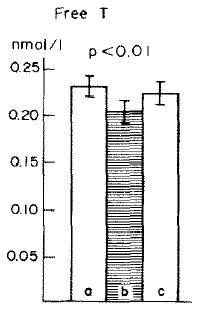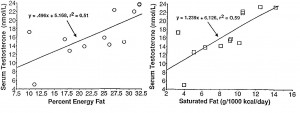It is known. Carbohydrate restriction improves (lowers)
testosterone in women with PCOS. It works for men, too… but by “works” I
mean “increases.”
Decrease of serum total and free testosterone during a low-fat high fibre diet (Hamalainen et al., 1982)
Intervention pseudo-crossover study: 30 healthy Finnish men in their
40’s were studied on their habitual high fat diet (40% fat), then put
on a low-fat (25%) high fibre diet for 6 weeks, then switched back to
high fat. The high fat diet was also higher in saturates, P:S ratio
0.15 vs. 1.25.

Free testosterone levels declined on the low fat diet, but they
recovered after 6 weeks of going back to their high [saturated] fat
dieting (p < 0.01).
Some observational data: Testosterone and cortisol in relationship to dietary nutrients and resistance exercise (Volek et al., 1997)
…fat, and in particular saturated fat, is associated with increased testosterone levels [in men]:

Off-topic (just came across this and felt like sharing): Effects of replacing meat with soyabean in the diet on sex hormone concentrations in healthy adult males (Habito et al., 2000)
42 healthy men aged 35-62 ate either 150 g meat or an equivalent
amount of protein from tofu daily for 4 weeks, 2 week washout, then
crossover.
Tofu
reduced free testosterone (p=0.06) and increase estrogen (p=13)…
testosterone:estrogen ratio reduced on tofu diet (p=0.06). Effects
weren’t robust, but this is a crossover study.

just sayin’ moving on: Body composition and hormonal responses to a carbohydrate-restricted diet (Volek et al., 2000) 12 healthy men switched from their habitual 48% carb diet to an 8%
carb diet for 6 weeks. Protein intake increased from 113 to 176 g/d and
fat intake nearly doubled, 32% to 61% with a lot of saturates. Dietary
cholesterol also increased from 332 mg to 741 mg/d. A lot of dietary
changes and predictable responses: 2 kg drop in body weight , 3 kg fat
loss and 1 kg muscle gain… Insulin levels declined, and free
testosterone increased from 0.48 to 0.53. No effect on total
testosterone… increased dietary cholesterol –> increased
testosterone? not in this study –> #SHBG.

but low carb ketogenic diets specifically reduce testosterone in PCOS…
Intensive insulin therapy increases sex hormone binding globulin in newly diagnosed type 2 diabetic patients (Tong et al., 2013)
Lower serum testosterone is independently associated with insulin resistance in non-diabetic older men: the Health In Men study (get it? H.I.M.) (Yeap et al., 2009)
In PCOS, hyperinsulinemia screws up GnRH secretion resulting in an
exaggerated LH:FSH response… this increases ovarian androgen production,
hirsutism. Men don’t have ovaries, and at least one study showed LH isn’t *directly* affected by insulin [in men] (Pesant et al., 2013)… (although this doesn’t rule out subtle changes in LH pulsatility or some other rarely measured parameter).
I suspect part of the effect [in men] is mediated by aromatase. The
gyno might be permanent, but the loss of libido doesn’t have to be.
Cause or effect? The diet stuff (above) suggests diet-induced
hormonal alterations are a part of the cause. Of course, it seems to
work both ways: androgen deprivation therapy *causes* insulin resistance (Haidar 2007). Imho, however, in practice, diet should be at least considered because it’s an easy remedy: eat better.
calories proper
testosterone in women with PCOS. It works for men, too… but by “works” I
mean “increases.”
Decrease of serum total and free testosterone during a low-fat high fibre diet (Hamalainen et al., 1982)
Intervention pseudo-crossover study: 30 healthy Finnish men in their
40’s were studied on their habitual high fat diet (40% fat), then put
on a low-fat (25%) high fibre diet for 6 weeks, then switched back to
high fat. The high fat diet was also higher in saturates, P:S ratio
0.15 vs. 1.25.

Free testosterone levels declined on the low fat diet, but they
recovered after 6 weeks of going back to their high [saturated] fat
dieting (p < 0.01).
Some observational data: Testosterone and cortisol in relationship to dietary nutrients and resistance exercise (Volek et al., 1997)
…fat, and in particular saturated fat, is associated with increased testosterone levels [in men]:

Off-topic (just came across this and felt like sharing): Effects of replacing meat with soyabean in the diet on sex hormone concentrations in healthy adult males (Habito et al., 2000)
42 healthy men aged 35-62 ate either 150 g meat or an equivalent
amount of protein from tofu daily for 4 weeks, 2 week washout, then
crossover.
Tofu
reduced free testosterone (p=0.06) and increase estrogen (p=13)…
testosterone:estrogen ratio reduced on tofu diet (p=0.06). Effects
weren’t robust, but this is a crossover study.

just sayin’ moving on: Body composition and hormonal responses to a carbohydrate-restricted diet (Volek et al., 2000) 12 healthy men switched from their habitual 48% carb diet to an 8%
carb diet for 6 weeks. Protein intake increased from 113 to 176 g/d and
fat intake nearly doubled, 32% to 61% with a lot of saturates. Dietary
cholesterol also increased from 332 mg to 741 mg/d. A lot of dietary
changes and predictable responses: 2 kg drop in body weight , 3 kg fat
loss and 1 kg muscle gain… Insulin levels declined, and free
testosterone increased from 0.48 to 0.53. No effect on total
testosterone… increased dietary cholesterol –> increased
testosterone? not in this study –> #SHBG.

but low carb ketogenic diets specifically reduce testosterone in PCOS…
Intensive insulin therapy increases sex hormone binding globulin in newly diagnosed type 2 diabetic patients (Tong et al., 2013)
Lower serum testosterone is independently associated with insulin resistance in non-diabetic older men: the Health In Men study (get it? H.I.M.) (Yeap et al., 2009)
In PCOS, hyperinsulinemia screws up GnRH secretion resulting in an
exaggerated LH:FSH response… this increases ovarian androgen production,
hirsutism. Men don’t have ovaries, and at least one study showed LH isn’t *directly* affected by insulin [in men] (Pesant et al., 2013)… (although this doesn’t rule out subtle changes in LH pulsatility or some other rarely measured parameter).
I suspect part of the effect [in men] is mediated by aromatase. The
gyno might be permanent, but the loss of libido doesn’t have to be.
Cause or effect? The diet stuff (above) suggests diet-induced
hormonal alterations are a part of the cause. Of course, it seems to
work both ways: androgen deprivation therapy *causes* insulin resistance (Haidar 2007). Imho, however, in practice, diet should be at least considered because it’s an easy remedy: eat better.
@CaloriesProper @IanLane88 in a way e and t are opposite neg feedback regulators in men and women. They are byproduct of steroidogenesis.
— Jane Plain (Woo) (@ItsTheWooo) November 17, 2013
calories proper
This entry was posted in Advanced nutrition, clamp, diet, Dietary fat, fertility, insulin, sex, testosterone and tagged calories, carbohydrates, carbs, diet, fat, insulin, testosterone. Bookmark the permalink.